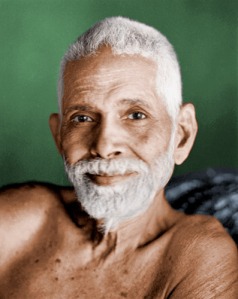Sri Bhagavan generally used two fountain pens: one contained blue ink, the other, red. Both of these pens were quite old and looked, to me at least, worn out. One day the top cover of the red-ink pen cracked, so a devotee took it to town to have it repaired. It was gone for several days. During this period Sri Bhagavan reverted to an old-fashioned nib pen which had to be dipped in an ink pot of red ink. Since this seemed to cause him some inconvenience, I decided to get him a new pen. I wrote to a friend in Bombay and asked him to send one immediately. A few days later the pen arrived by post. I went straight to Sri Bhagavan and handed over the unopened parcel containing the pen. Continue reading
Continue reading
Monthly Archives: November 2013
Viswanatha Swami_ A Hidden Gem: By Murray Feldman
Viswanatha Swami first came to stay with Bhagavan Sri Ramana Maharshi when he was about 19 years old. His father, Ramaswamy Iyer, was a first cousin of Bhagavan.
I had the good fortune to spend considerable time with this great devotee of Ramana Maharishi from April 1976, until he became ill and passed away at 75 years of age on the 22nd November, 1979. How he came to Bhagavan has been written about elsewhere. Here I attempt to show how he exemplified, so wonderfully and devotedly the teachings of Bhagavan. Continue reading
In the Jaws of the Beloved Tiger: By Dr. Evan Keith
I do not know when I first learned of Bhagavan Sri Ramana Maharshi. I know that at most he was little more than a name to me before my eighteenth birthday and only in the last year has he become of central importance to me. In fact, now I think of Bhagavan as my Guru. Bhagavan never did formal initiation of anyone as a devotee and never even referred to anyone as being or not being his devotee. Nevertheless, he sometimes mentioned that most people needed a guru to overcome their ancient tendencies and “realize” the Self. Sometimes Bhagavan would allude to the Self, itself, or in particular the mountain Arunachala as having been his Guru. In this respect, Bhagavan Ramana is my Sadguru and I am His devotee. Continue reading
Upadesa Saram Verse 1: Comments by Dr. Suryanarayana Raju
Verse1: kartur agyaya prapyathe phalam. karma kim param? karma tat jadam.
Meaning of the words.
kartur: The ordainer of results. God.
agyaya: as per His orders.
prapyathe phalam: The results are obtained.
karma : the actions
kim param : Are they supreme ? [Meaning is the law of karma the ultimate ? Who is the one who makes it happen then? ]
karma tat jadam: Actions are jadam, dead lifeless entities.
English translation of Verse 1:
“Action is insentient. Action is not the ultimate reality so action per se has no ability to confer the fruit of action. Fruit of action occurs according to the whim of the ultimate reality which is usually called God.”
Comments by Dr. Raju:
In his classic work Upadesa Saram (Spiritual Instructions) Bhagavan is questioning the idea of doership in the first verse itself. Bhagawan explains in the first verse why the individual performing the action is not the doer. Continue reading




You must be logged in to post a comment.